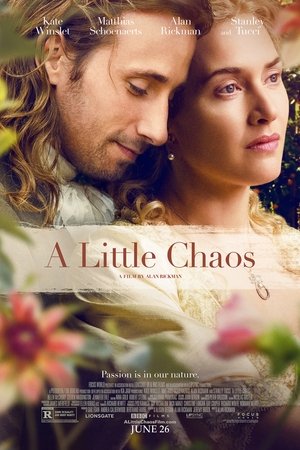
A Little Chaos
**Despite being nice and visually beautiful, it is a film full of problems.** I don't think you need to be a historian or an art lover to recognize that the Palace of Versailles is one of the most iconic European buildings, not only because of the impact it had (it was copied throughout almost all of Europe and still serves as an inspiration to many artists and architects) but also for the mysticism it contains, as the height of luxury, sophistication and power, centralized and ritualized. It's more than a building, it's a symbol. This film focuses its attention on the enormous garden and park of the palace, and invents a nice story around them, which says more about our mentality than about the people of those times. Don't get me wrong: the film is enjoyable, but we must never assume that it is a historical film, or that any of the situations occurred in real life. It's fiction, and so are most of the characters. The king existed, of course, but it would be difficult for him to pass for a gardener in his own palace. The gardens were designed by André Le Nôtre, and he was also the author of the gardens of the Tuileries, in Paris, and the gardens of the palaces of Chantilly, Fontainebleau and Vaux-le-Vicomte. But he was an old man at the time the film takes place, not the dapper man played by Matthias Schoenaets. Madame de Montespan and Madame de Maintenon existed, but the latter was older than the former, contrary to what this film suggests. Sabine de Barra never existed, and a woman would have never been admitted to service in that job. There are no feminisms in this society. Another problem with this film is its central theme: order and chaos in the garden of Versailles. If we're honest about it, there's no room for chaos in a garden like this. Everything was thought and planned, even the time when Orangerie plants are kept in a greenhouse! The very space that Sabine de Barra creates in this film (which is, in fact, a Le Nôtre's work, the “Bosquet de la Salle du Ball”) is pure order. The French formal garden with topiaries, neat flower beds, sanded walks, is order. Where is the chaos anyway? The best thing about this film is, in fact, the enormous quality of its cast. Kate Winslet is impeccable and does a very good job, along with director/actor Alan Rickman and Stanley Tucci. It's Matthias Schoenaets who gets the paint dirty: not only is he too young for the role of Le Nôtre, he doesn't have any romantic chemistry with Winslet. Incidentally, the problem lies more in the poor conception of the characters, who think and behave like people of the 21st century, most of the time (this includes some inappropriate sex scenes, like that scene inside the carriage... how uncomfortable it can be to make it inside a carriage from that period!). Helen McCrory is another problem. She does what she can, but her character is clichéd and only serves to give her husband more reason to throw himself into another woman's lap. On a technical level, I really liked the sets, all shot in the UK, without setting foot in France. It was not necessary. The costumes are also very good, and I didn't notice any glaring or unforgivable anachronisms in the costumes, props or scenery. The cinematography is regular, as are the dialogues. The soundtrack isn't bad, it does its job skillfully.
